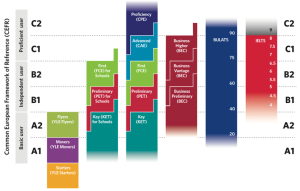Time
The time you have should be dedicated to two stages:
- First, to improve your general English,
- Second, to become test-wise
The first stage is clear. As can be seen, the CEFR table says that to get a band 6.5, you need to improve your general English and become a B2 learner. So, if you’re a learner of the lower level, say B1, you need to spend time improving your general English first. A B1 learner is expected to answer about 15 questions out of 40 in the Reading and Listening part of the test (which equals a band of 4.5). In case this candidate requires a band of 6.5 for Listening, they need to answer about 27 questions, which is the expected band score for a strong B2 learner. This development in the number of correct answers from 15 to 27 is impossible if the candidate only tries to make progress by doing the Listening test. In this situation, improving general English knowledge is essential, and by that, I mean practicing English without thinking about the IELTS test. Preparation for the IELTS test, known as the test-wise process, begins in stage two. Usually, improving general English knowledge takes a lot of time and effort unless the score candidates want is proportional to their English level. For instance, a strong learner of B2 level who needs a band 6 can skip the “improving general English” step cause they already have the potential to reach the band score they want. All they need is to become test-wise












